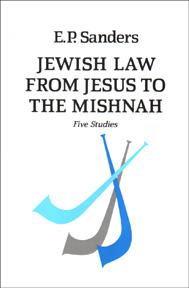Multimedia • Reference • Religion • Travel |
 Jewish Law from Jesus to the Mishnah E P Sanders
Description From The Publisher: In this volume E. P. Sanders advances his re-examination of the nature of Jewish Law which he began in Paul and Palestinian Judaism. As usual, he is able to shed new light on old questions and demonstrate that many accepted interpretations are misguided. In the chapter on 'Jesus and the Law' he considers how serious the legal issues discussed between Jesus and his opponents would have been had they been authentic - a comparison which has never before been undertaken. An Examination of the Pharisaic legal corpus sets the author apart from the conclusions of one of the most prolific writers in this area. Similarly, a concluding section on the 'philosophy' behind the Mishnah distinguishes Professor Sanders' work from other studies. About the Author E.P. Sanders is Arts and Sciences Professor of Religion at Duke University, Durham, North Carolina. His other Fortress Press books include Paul, the Law, and the Jewish People (1983) and Jesus and Judaism (1985), winner of the 1990 Louisville Grawemeyer Award in Religion. Paul and Palestinian Judaism received the 1978 National Religious Book Award, Scholarly Book Category, from Religious Book Review. Table of Contents
Customer Reviews Write your own online review. Look for Similar Books by Subject | ||||||||
Copyright ©1996-2003 CenturyOne Bookstore. All Rights Reserved. All prices subject to change and given in U.S. dollars. Your purchase from CenturyOne.com will assist the CenturyOne Foundation in providing funding for various archaeological and research projects which seek to provide more information about the period of the First Century C.E., the origins of Christianity and the world of the Bible in general. All materials contained in http://www.centuryone.com are protected by copyright and trademark laws and may not be used for any purpose whatsoever other than private, non-commercial viewing purposes. Derivative works and other unauthorized copying or use of stills, video footage, text or graphics is expressly prohibited. |
